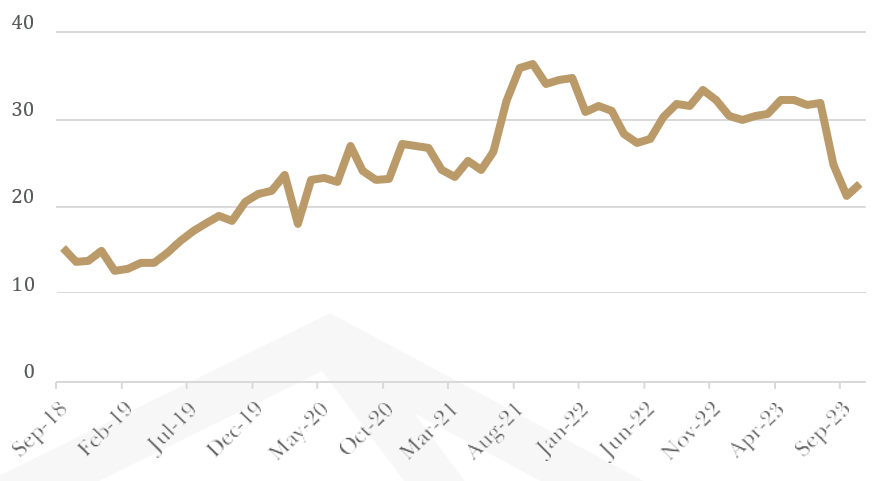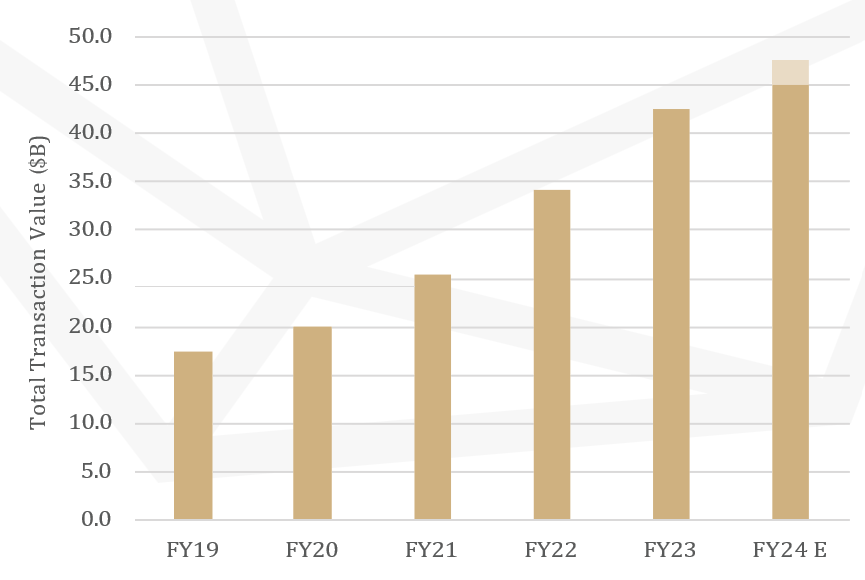3 names to take advantage of the recent volatility
Investors have been skittish so far this financial year. Concerns about consumer confidence continue. The latest consumer confidence data from ANZ-Roy Morgan remains 30% below long-term levels. And higher interest rate expectations, required to tame still-high inflation, have meant the yield on 10-year Australian government bonds rose above 4.6%, having started the financial year at 4%. This has not made for a good backdrop for stocks, especially smaller ones.
In the past three months, investments in Qantas (ASX: QAN) and Seven Group (ASX: SVW) were fully exited on valuation grounds. Qantas is already back to more attractive levels and the first $1 of Pointsbet’s (ASX: PBH) expected $1.40 in capital returns has already been paid (see the July monthly report). That has left a nice cash balance with which to take advantage of recent volatility and add new investments to the portfolio.
Plenty of capacity for margins to improve for ResMed
The first of these is sleep apnoea device maker ResMed (ASX: RMD). ResMed’s ASX share price has fallen 31% in the past three months. Most of its revenue is in US dollars and its main listing is in the US, where the share price fall has been an even more severe 34% (the weak Australian dollar has cushioned the blow here).
ResMed’s results for the June quarter weren’t great. While revenue growth has been excellent—its main competitor Philips is out of the market—ResMed’s cost base has been growing just as quickly The company has an enormously long runway ahead of it and plenty of capacity for margins to improve. Sleep apnoea affects a growing percentage of the world’s ageing, fattening population and the proportion of those seeking treatment is still much lower than it should be.
ResMed’s sleep apnoea machines are the best solution on the market and its dominant market share allows it to collect more patient data and spend more money on research and development than anyone else, which has made it one of the best-performing listed companies in the world since its IPO in 1995.
While the stock price was weak after ResMed’s results in early August, it tanked on the result of Novo Nordisk’s (CPH: NOVO-B) Wegovy trial a few days later.
RESMED SHARE PRICE IN AUSTRALIAN DOLLARS

Source: Bloomberg
Wegovy belongs to a class of drugs, commonly referred to as GLP-1 agonists, that have been used for a while in diabetes management but they are now being recognised as effective drugs for weight loss and the concomitant benefits of it, such as reduced incidence of cardiovascular disease, moderation in Type 2 diabetes progression, and, potentially, a reduction in the severity of sleep apnoea. The drugs work and have the potential for widespread societal benefits.
Mr. Market was very quick to react frantically, as he always does, sending many shares in the healthcare sector, particularly those that treat diseases correlated with obesity, like diabetes and sleep apnoea, down somewhere between 20 and 50%.
However, the implied impact on ResMed is significantly overdone. While GLP-1 drugs will (hopefully) be effective in reducing the incidence of cardiovascular events and achieving weight loss for some individuals at high risk, they are not a silver bullet that “cures obesity” or gets rid of your sleep apnoea. Add to that an abundance of unknowns: what does the treatment protocol look like, who pays for it (quite pricey at US$15,000 a year in the US), what are the side effects and what happens when you get off the drug?
We will be watching closely but expect sleep apnoea will still be a bigger problem in 20 years’ time than it is today. Hopefully, GLP-1s are a safe part of the suite of treatments, but ResMed’s dominant role in the ecosystem is likely to still be in place.
We have made an initial investment at the most compelling valuation ResMed has traded at since 2016 (21 times earnings). The market’s panic looks like an excellent opportunity.
EQT boring but beautiful
Boring but beautiful is an apt way to describe EQT Holdings (ASX: EQT). The business provides trustee and wealth services for individuals, managed fund investors and superannuation fund members with assets worth over $160bn. Formerly known as Equity Trustees, it traces its origins back to 1888.
Trust is the company’s key product. And, in a financial world where trust is in short supply, EQT’s services will be an even more important part of the financial landscape over the next decade.
Across Trustee and Wealth Services, the business oversees more than $16bn worth of estates, charitable trusts, native title trusts, and personal injury trusts among others. A bank of more than 52,000 wills ensures new clients for decades to come. Some revenue streams are perpetual in nature. Last year’s acquisition of Australian Executor Trustees from Insignia Financial (ASX: IFL) cemented EQT’s already significant presence in philanthropy and personal injury.
The rest of the business provides fund governance and trustee services for managed investment trusts and superannuation funds. Alongside Perpetual’s (ASX: PPT) Corporate Trustee business, EQT is the go-to for all things trustee in funds management, serving 363 funds from 134 fund managers
Both divisions are exposed to the movement in listed asset values. If equity markets trend down, lower revenues will lead to reduced profits. However, in our view, being exposed to equity markets will benefit the business for most years and over the long term.
The business is high quality and highly recurring in nature. Over the next year that should become more apparent to investors as significant synergies from a recent acquisition start to contribute, losses from a foray into the UK are eliminated and organic growth drives margin improvement. At a price-to-earnings ratio of about 14 times next year, with continued steady growth, we’ve put our trust in Equity Trustees.
Big bank losses are Tyro's to gain
Another high-quality business that has made its way into the portfolio is payment terminal provider Tyro (ASX: TYR). Tyro processed 5.4% of total in-person card spend across Australia in financial year 2023. That is up from 1.5% in 2015. Among health, hospitality and retail businesses, Tyro’s industry-specific offerings now process one in five dollars spent in person.
Tyro’s gain has come mostly at the expense of the big banks. They still account for more than 70% of the terminals in operation, despite losing more than 85,000 terminals in the three years to 2022. In the same time, Tyro won roughly 40,000 of those terminals. Other competitors, which have strengthened over recent years, were also net winners.
So what is Tyro doing right?
A better product, with industry-specific features and more point-of-sale software integrations. And better service, with a 24/7 focus on small businesses the banks are failing to match.
Tyro’s clip of the merchant’s transaction value is highly variable, but the rack rate of 1.4% is competitive with the new entrants trying to win merchants away from the big banks.
TYRO GROSS TRANSACTION VOLUME

Source: Tyro Full Year Results FY23
Much like EQT, Tyro’s revenue is recurring, with transaction value churn at a little over 9%. Growth in Tyro’s core merchants was 14% last year, with the last 5 years compounding at 18% per annum. And cost control, which prior management teams have struggled with, is now very much front of mind for the new management team. Current guidance suggests more than 70% of incremental gross profit falling through to management’s preferred measure of earnings. We count more of the expenses, but think they are setting expectations deliberately low.
After a 2019 IPO at $2.75 per share, Tyro’s share price traded at over $4 in late 2021. Only two years later the share price languishes at just over $1.30. It is not an easy business to value, having only just crossed the threshold to profitability in the past 12 months (Tyro has been around for more than 20 years). But, after share-based compensation and adjusting for excess cash, the business trades on a price-to-earnings ratio of about 21 times next year’s earnings. With continued merchant growth, the business should grow rapidly in the years to come.
All three new portfolio additions should grow nicely over the coming decade. They are excellent substitutes for some of the larger businesses that have recently been sold and sit nicely alongside our cash holdings, which still represented 14% of the portfolio at the end of September.
Learn more about Forager
If you share our passion for unloved bargains and have a long-term focus, Forager could be the right investment for you. Click 'FOLLOW' below for more of my insights.
For all of Forager's latest content, videos, podcasts and fund reports, register here.

3 topics
9 stocks mentioned
1 fund mentioned
.jpg)
.jpg)